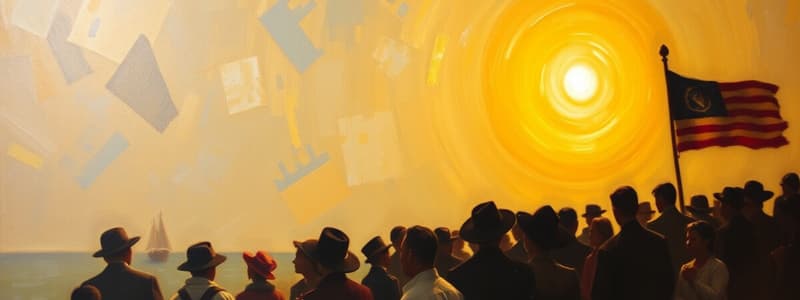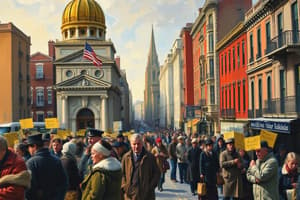Podcast
Questions and Answers
What action did Andrew Johnson take regarding ex-Confederates after the Civil War?
What action did Andrew Johnson take regarding ex-Confederates after the Civil War?
- Provided them with government jobs
- Wished for all to be hanged (correct)
- Allowed them to serve in Congress
- Wanted them to be imprisoned for life
What was the outcome of the Radical Republicans' attempt to impeach Andrew Johnson?
What was the outcome of the Radical Republicans' attempt to impeach Andrew Johnson?
- It failed by one vote (correct)
- It was not attempted due to lack of interest
- It led to Johnson's resignation
- It succeeded with significant support
What significant legislation did Senator Charles Sumner introduce?
What significant legislation did Senator Charles Sumner introduce?
- The Civil Rights Act of 1875 (correct)
- The Civil Rights Act of 1866
- The Reconstruction Act
- The Amnesty Act of 1872
Which President did the Radical Republicans elect in 1868?
Which President did the Radical Republicans elect in 1868?
What was the effect of the Amnesty Act passed in 1872?
What was the effect of the Amnesty Act passed in 1872?
Which companies were granted rights by the Pacific Railway Act of 1862?
Which companies were granted rights by the Pacific Railway Act of 1862?
What does horizontal integration primarily involve?
What does horizontal integration primarily involve?
What major contribution did George Washington Carver make?
What major contribution did George Washington Carver make?
Who is credited with inventing the typewriter?
Who is credited with inventing the typewriter?
Which individual is known for building a significant railroad system?
Which individual is known for building a significant railroad system?
Who was elected as the 20th President of the United States in 1881?
Who was elected as the 20th President of the United States in 1881?
What event did Doc Holiday and Wyatt Earp participate in?
What event did Doc Holiday and Wyatt Earp participate in?
What significant legislative act created a civil service system in 1883?
What significant legislative act created a civil service system in 1883?
What was the outcome of Charles Guiteau's attack on President Garfield?
What was the outcome of Charles Guiteau's attack on President Garfield?
What event began on April 22, 1889?
What event began on April 22, 1889?
What was a major goal of Progressivism during the late 19th and early 20th centuries?
What was a major goal of Progressivism during the late 19th and early 20th centuries?
What did the Jim Crow Laws accomplish?
What did the Jim Crow Laws accomplish?
Which amendment was proposed as a solution to prevent the state government from discriminating against African-Americans?
Which amendment was proposed as a solution to prevent the state government from discriminating against African-Americans?
What was required by Lincoln's plan for reconstruction?
What was required by Lincoln's plan for reconstruction?
What was a focus of the Temperance Movement?
What was a focus of the Temperance Movement?
What did the Wade-Davis Bill of July 1864 propose?
What did the Wade-Davis Bill of July 1864 propose?
Which group was primarily served by the Freedmen's Bureau?
Which group was primarily served by the Freedmen's Bureau?
What was one of the restrictions imposed by Black Codes?
What was one of the restrictions imposed by Black Codes?
Flashcards are hidden until you start studying
Study Notes
Immigration and Reconstruction
- Late 19th and early 20th centuries saw a wave of immigration driven by poverty in native countries.
- Major goal of Progressivism was the elimination of corruption and abuse by government and big business.
- Jim Crow Laws institutionalized the segregation of African-Americans in the South.
- The Temperance Movement focused on prohibition of alcohol.
- The Fourteenth Amendment, proposed in June 1866, aimed to prevent state discrimination against African-Americans.
- Lincoln's Reconstruction plan required a 10% loyalty oath from citizens of Southern states for governance establishment.
- President Abraham Lincoln was assassinated by John Wilkes Booth on April 14, 1865, while attending a play.
- Lincoln died the next day from the gunshot wound.
Black Codes
- Black Codes imposed restrictions on African-American citizenship rights.
- Laws limited employment to house servants or agricultural work for African-Americans.
- Prohibited African-Americans from residing in towns and owning firearms.
Wade-Davis Bill
- The Wade-Davis Bill, proposed in July 1864, required over 50% of registered voters in rebellious states to take an oath of loyalty.
The Freedmen's Bureau
- The Freedmen's Bureau was established post-Civil War for social services to freed slaves and poor whites.
Andrew Johnson's Presidency
- Andrew Johnson took office after Lincoln's assassination and sought retribution against ex-Confederates.
- Johnson's leniency led to former Confederate states quickly meeting readmission conditions and electing delegates to Congress.
- Radical Republicans deemed Johnson insufficiently effective against the Black Codes and attempted to impeach him.
- Impeachment failed by a single vote, reflecting political divisions.
- In the summer of 1866, white mobs attacked African-Americans, resulting in over 100 deaths.
- Radical Republicans elected Ulysses S. Grant as president in 1868.
- The Amnesty Act of 1872 allowed all ex-Confederates to hold political office.
- Charles Sumner introduced the Civil Rights Act of 1875 to protect African-American rights.
Business Innovations and Key Figures
- The Pacific Railway Act of 1862 facilitated railroad expansion between Omaha and Sacramento.
- Horizontal integration involves controlling an industry stage, evident in the oil refining by Standard Oil.
- Western railroads flourished post-Kansas-Nebraska Act, primarily routing through Chicago.
- Andrew Carnegie leveraged the Bessemer process for steel production; he championed vertical integration.
- Alexander Graham Bell invented the telephone.
- George Washington Carver developed over 300 products from peanuts and taught at Tuskegee Institute.
- Thomas Alva Edison is notable for the invention of the light bulb.
- Joseph Glidden created barbed wire, revolutionizing fencing.
- Cyrus McCormick introduced the first grain reaper, enhancing agricultural efficiency.
- Christopher Sholes invented the typewriter, impacting communication.
- Cornelius Vanderbilt improved railroad safety and efficiency.
Late 19th Century Events
- James A. Garfield was elected the 20th President in 1881, defeating Winfield Scott Hancock.
- Garfield was shot by Charles Guiteau in July 1882, surviving for eleven weeks post-assassination.
- The Pendleton Act of 1883 established a civil service system in response to corruption.
- The Gunfight at the OK Corral featured Doc Holiday and Wyatt Earp in Tombstone, Arizona.
- George Armstrong Custer perished at the Battle of Little Bighorn, a significant Native American victory.
- William “Buffalo Bill” Cody was hired to kill buffalo for transcontinental railroad workers.
- The Oklahoma Land Rush began on April 22, 1889, marking a significant westward migration.
Studying That Suits You
Use AI to generate personalized quizzes and flashcards to suit your learning preferences.



